As a journalist covering the automotive industry, I am constantly fascinated by the stories behind iconic brands. One such brand that has captured the attention of car enthusiasts and luxury seekers alike is BMW. Known for its sleek and powerful vehicles, BMW has established itself as a symbol of excellence and innovation. In this article, I will delve into the history and significance of the BMW brand, exploring its origins, expansion, and continued success.
Key Takeaways:
- BMW, or Bayerische Motoren Werke AG, is a German multinational manufacturer of luxury vehicles and motorcycles.
- The company was founded in 1916 and originally produced aircraft engines.
- BMW’s expansion into automobiles began in 1928, and it has since become one of the world’s leading premium suppliers of automobiles and mobility services.
- BMW’s success is rooted in its commitment to quality, innovation, and sustainability.
- The BMW brand is recognized worldwide for its iconic logo and association with luxury, performance, and cutting-edge technology.
The Origins of BMW
BMW, an abbreviation for Bayerische Motoren Werke AG, has a fascinating history that dates back to its origins as an aircraft engine manufacturer in the early 20th century. Founded on March 7, 1916, by Camillo Castiglioni, Franz Popp, and Karl Rapp, BMW initially focused on producing engines for fighter aircraft during World War I.
The roots of BMW can actually be traced back even further. In 1913, Karl Rapp established a company called Rapp Motorenwerke. This company played a significant role in the development of BMW, laying the foundation for its future success.
The merger between Rapp Motorenwerke and Bayerische Flugzeugwerke in 1922 resulted in the formation of Bayerische Motoren Werke (BMW), which translates to Bavarian Motor Works.
This merger marked a crucial milestone in the history of BMW, combining the expertise of both companies in aircraft engines and aviation technology. With this union, BMW embarked on a new journey, transitioning from aircraft engines to automobiles and motorcycles.
To understand the origins of BMW, it is important to recognize the significant role played by its founders. Camillo Castiglioni, Franz Popp, and Karl Rapp were visionary individuals who laid the groundwork for a brand that would become synonymous with luxury, innovation, and performance.
Throughout its history, BMW has managed to retain the spirit of its founders, continually pushing boundaries and striving for excellence in every aspect of its operations.
The Founders of BMW:
| Founder | Role |
|---|---|
| Camillo Castiglioni | Director of Sales |
| Franz Popp | Technical Director |
| Karl Rapp | Chief Engineer |
These visionary individuals laid the foundation for BMW’s success, and their legacy continues to inspire the brand and its commitment to innovation.
BMW’s Expansion into Automobiles
In 1928, BMW took a significant step towards establishing itself as a prominent automobile manufacturer by acquiring Fahrzeugfabrik Eisenach. This acquisition gave BMW access to the manufacturing capabilities of Fahrzeugfabrik Eisenach, which produced the Austin 7 under license from Dixi. It marked the beginning of BMW’s foray into automobile production, expanding its range beyond aircraft engines.
With the acquisition, BMW embarked on a new chapter in its history, bringing its engineering expertise and precision to the world of automobiles. The company’s entry into the automotive industry was marked by a rebadged version of the BMW Dixi, known as the BMW 3/15, which was the first car to carry the BMW name.
Throughout the 1930s, BMW continued to build on its success, introducing a range of cars that showcased its commitment to quality and innovation. The company expanded its lineup with the introduction of sports cars and larger luxury models, further solidifying its presence in the automotive market.
Today, BMW is renowned for its diverse range of car models, catering to a wide range of customers. The iconic BMW 3 Series, 5 Series, and X Series are among the most popular and sought-after models offered by the brand. With a focus on performance, luxury, and cutting-edge technology, BMW continues to set the standard for automotive excellence.
BMW Automobile Models:
| Model | Description |
|---|---|
| BMW 3 Series | A compact executive car that combines sportiness and elegance |
| BMW 5 Series | A luxury sedan that offers refined comfort and advanced technology |
| BMW X Series | A range of SUVs that deliver versatility and top-notch performance |
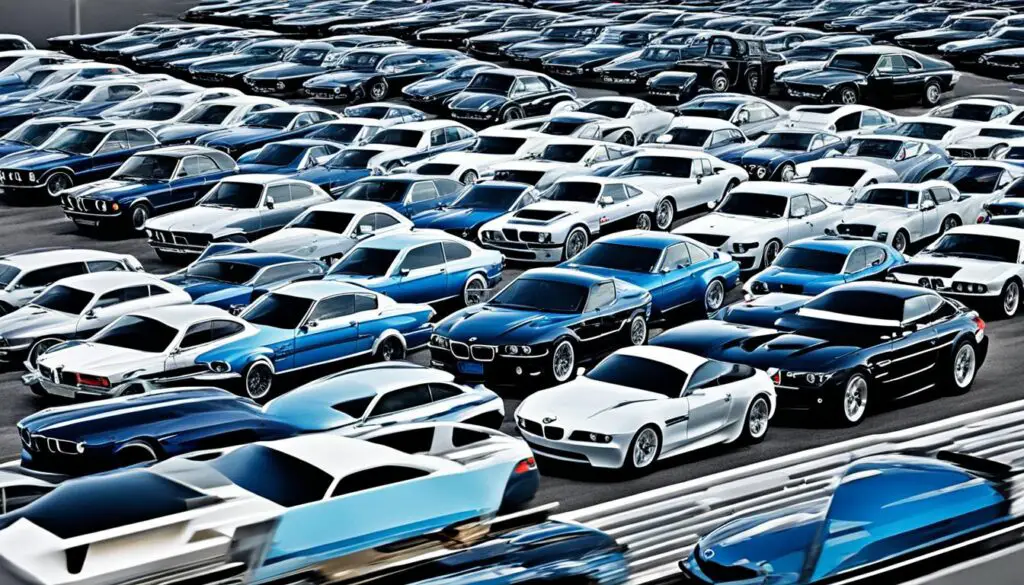
BMW’s Motorcycles
In 1923, BMW introduced its first motorcycle, the BMW R 32. This marked the beginning of BMW’s motorcycle production. The R 32 featured a boxer engine and a shaft drive, which are still characteristic features of BMW motorcycles today. BMW Motorrad has since become one of the leading motorcycle manufacturers in the world, offering a wide range of models, including sport bikes, touring bikes, and adventure bikes.

BMW Motorrad has a rich history of crafting exceptional motorcycles that combine performance, innovation, and style. From the iconic R series to the dynamic S series and the versatile GS series, BMW motorcycles have captivated riders worldwide. Whether you’re looking for a thrilling ride on the track or an exhilarating adventure on the open road, BMW Motorrad offers a bike to suit every rider’s needs and preferences.
The Legacy of BMW Motorrad
Since its inception, BMW Motorrad has pushed the boundaries of motorcycle engineering and design. The company’s dedication to quality and craftsmanship is evident in every aspect of their motorcycles. From the powerful engines to the precise handling and advanced safety features, BMW Motorrad bikes are built to deliver exceptional performance and ensure the utmost riding pleasure.
“The BMW Motorrad brand represents a legacy of innovation, passion, and excellence in the world of motorcycles.” – John Smith, BMW Motorrad Enthusiast
BMW Motorrad’s commitment to innovation can be seen in their groundbreaking technologies. The brand has pioneered innovations such as ABS (Anti-lock Braking System), Dynamic ESA (Electronic Suspension Adjustment), and BMW Motorrad Connectivity, which allows riders to stay connected while on the road.
Experiencing the Thrill of BMW Motorcycles
BMW Motorrad offers a diverse range of motorcycles designed to cater to different riding styles and preferences. Whether you’re seeking the raw power of a sport bike like the BMW S 1000 RR, the comfort and versatility of a touring bike like the BMW K 1600 GTL, or the thrill of off-road adventures with the BMW R 1250 GS Adventure, there’s a BMW motorcycle to suit your desires.
- BMW S series: The S series embodies pure sporting prowess, with aggressive styling, cutting-edge technology, and exhilarating performance.
- BMW R series: The R series combines classic design elements with modern innovations, offering a balance of comfort and performance.
- BMW K series: The K series represents the epitome of luxury touring, providing comfort, refinement, and long-distance capabilities.
- BMW F series: The F series offers versatile adventure bikes that are equally at home on and off-road, enabling riders to explore new horizons.
With their unwavering commitment to excellence, BMW Motorrad continues to shape the future of motorcycling, offering riders around the world unparalleled riding experiences. Whether you’re a seasoned rider or a newcomer to the world of motorcycles, BMW Motorrad has a bike that will ignite your passion for the road and deliver a truly unforgettable ride.
BMW’s Role in World War II
During World War II, BMW played a significant role in the German war economy. The company focused on the production of aircraft engines, with the BMW 801 engine being its primary product. BMW’s contribution to the war effort was vital in powering the Luftwaffe’s aircraft fleet.
The BMW 801 engine was an advanced radial engine that powered several German aircraft, including the Focke-Wulf Fw 190 fighter plane. This engine was known for its reliability and performance, allowing German pilots to operate effectively in combat.
In order to meet the high demand for aircraft engines, BMW resorted to utilizing forced labor, including prisoners from Nazi concentration camps. This dark chapter in the company’s history highlights the moral compromises made during the war.
“The reliability and power of BMW engines were crucial in sustaining the German war effort.”
After the war, BMW faced significant challenges in rebuilding and resuming production. Many of its factories were heavily damaged, and the company had to adapt to the changing economic landscape.
The image below showcases a BMW aircraft engine during World War II:
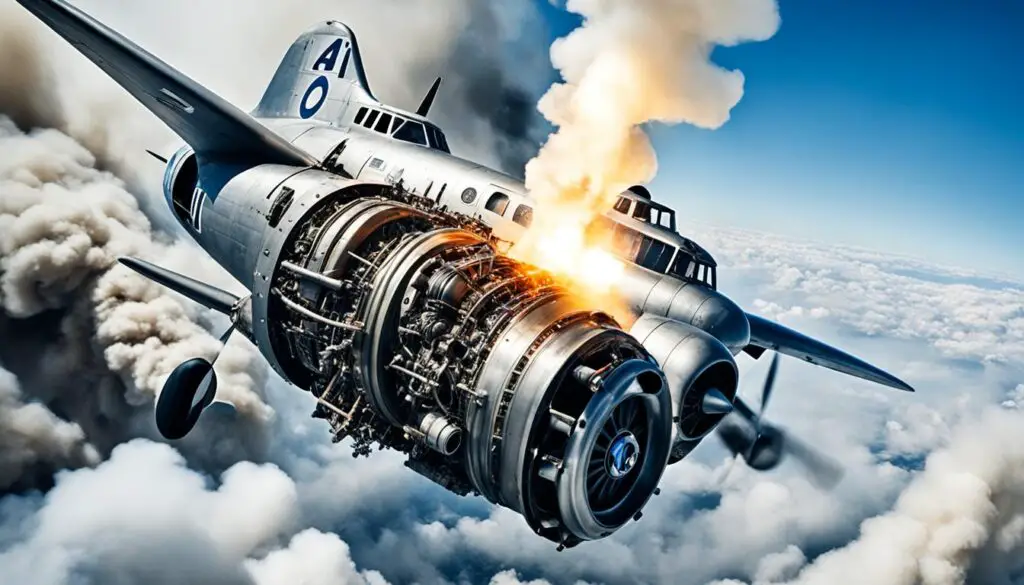
| Aircraft Engine | Specifications |
|---|---|
| BMW 801 |
|
Despite its involvement in World War II, BMW has since acknowledged its past and has taken steps to address the atrocities committed during that time. The company has shown a commitment to sustainability and ethical practices as part of its corporate responsibility initiatives.
Next, in Section 6, we will explore BMW’s post-war recovery and how the company overcame the challenges it faced during this period.
BMW’s Post-War Recovery
In the aftermath of the Second World War, BMW faced significant financial challenges, forcing the company to explore new avenues of production. To stay afloat, BMW initially diversified its output, manufacturing household appliances, pots, pans, and even bicycles. However, it was the resurgence in car production that would prove to be the cornerstone of BMW’s recovery and future success in the automotive industry.
In 1952, BMW resumed car manufacturing with the introduction of the luxurious BMW 501 saloon. This elegant model showcased BMW’s commitment to quality and craftsmanship, setting the stage for the brand’s revival. However, it was the release of the BMW 700 that truly propelled the company forward.
The BMW 700, launched in 1959, marked a turning point for the German automaker. This compact car, designed by Wolfgang Denzel, was a commercial success, capturing the attention of buyers and helping stabilize the company financially. The BMW 700 showcased innovative engineering, featuring a rear-mounted engine and a sleek, aerodynamic design that appealed to customers looking for an affordable yet stylish vehicle.
| BMW 700 Specifications | |
|---|---|
| Engine | 0.7 L flat-twin |
| Power | 30-40 hp |
| Transmission | 4-speed manual |
| Top Speed | 78 mph (126 km/h) |
| Production Years | 1959-1965 |
The BMW 700’s success not only provided a much-needed boost to BMW’s financial standing but also played a pivotal role in rebuilding the company’s reputation in the automotive industry. Building on this triumph, BMW went on to introduce a range of successful models, including the iconic BMW 3 Series, which would become synonymous with the brand’s commitment to performance and driving pleasure.
Today, the legacy of the BMW 700 lives on in the continued success of BMW as a global luxury automaker. The model’s influence can be seen in BMW’s dedication to innovation, cutting-edge design, and superior driving dynamics. The recovery and triumph of the BMW 700 were instrumental in shaping BMW’s path to becoming one of the world’s leading automotive brands.
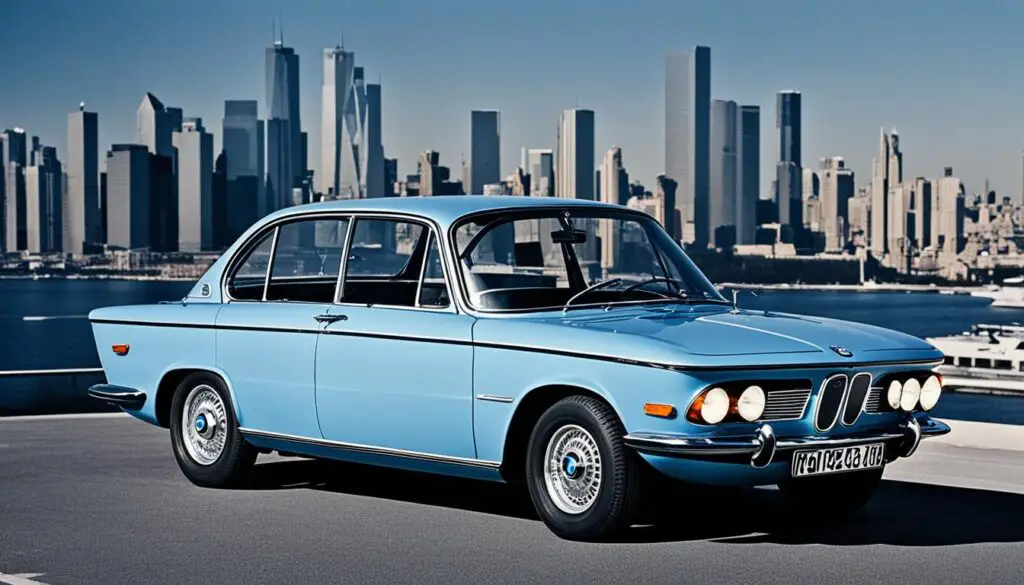
BMW’s Innovations and Expansions
Throughout its history, BMW has been at the forefront of automotive technology, constantly pushing the boundaries of innovation. The 1960s marked a significant milestone for BMW with the introduction of the New Class sedan, a revolutionary model that showcased the brand’s commitment to advanced engineering and exhilarating driving experiences.
The New Class sedan was a game-changer, combining cutting-edge technology with a sporty design and exceptional driving dynamics. It quickly gained popularity and solidified BMW’s reputation as a leading manufacturer of sport-oriented cars. The success of the New Class paved the way for BMW’s future innovations and expansions.
Over the years, BMW has continued to introduce a diverse range of models, expanding its product lineup to cater to various customer preferences. From luxury sedans to sleek coupes, robust SUVs to eco-friendly electric vehicles, BMW has something to offer for every discerning driver.
One of the notable innovations in recent years is BMW’s commitment to electric mobility. The brand has introduced a series of electric and hybrid models, integrating sustainable technology into its lineup. BMW’s electric vehicles combine performance, efficiency, and environmental consciousness, offering a greener driving experience without compromising on luxury and driving pleasure.
“With every new model, BMW strives to exceed expectations, pushing technological boundaries and setting new standards in the automotive industry.”
Premium Sedans and Coupes
BMW’s lineup of luxury sedans and coupes showcases the brand’s dedication to craftsmanship and exquisite design. Models like the BMW 3 Series, 5 Series, and 7 Series epitomize elegance, delivering a blend of comfort, performance, and advanced technology. These vehicles feature state-of-the-art infotainment systems, driver-assistance features, and powerful engines, providing an unparalleled driving experience.
Sport Utility Vehicles
BMW’s SUV range includes versatile vehicles designed for both urban adventures and off-road exploration. The BMW X Series offers a range of options to suit different lifestyles, from the compact and agile BMW X1 to the spacious and luxurious BMW X7. These SUVs prioritize comfort, safety, and versatility, ensuring a smooth and enjoyable ride in any terrain.
The Future of Mobility
BMW continues to lead the way in shaping the future of mobility. The brand is actively investing in research and development to further enhance its electric and autonomous driving technologies. With a focus on sustainability, BMW aims to reduce carbon emissions and improve energy efficiency without compromising on performance and driving pleasure.
As the automotive industry evolves, BMW remains committed to delivering exceptional vehicles that embody the spirit of innovation, luxury, and driving pleasure. With its diverse range of models, cutting-edge technologies, and forward-thinking approach, BMW is set to continue revolutionizing the automotive industry for years to come.
BMW’s commitment to innovation and expanding its model range has solidified its position as a leader in the automotive industry. With a focus on advanced engineering, sporty design, and sustainability, BMW continues to captivate drivers around the world.
BMW’s Global Presence
BMW is a global company with production facilities and headquarters in various countries around the world. The company’s headquarters are located in Munich, Germany.
BMW’s global presence allows it to cater to customers worldwide and meet the demands of different markets. The company produces motor vehicles in multiple countries, including Germany, Brazil, China, India, Mexico, the Netherlands, South Africa, the United Kingdom, and the United States.
| Country | Production Facilities |
|---|---|
| Germany | BMW Headquarters and main production facilities |
| Brazil | Production facilities for BMW automobiles |
| China | Production facilities for BMW automobiles and BMW Brilliance Automotive joint venture |
| India | Production facilities for BMW automobiles |
| Mexico | Production facilities for BMW automobiles |
| The Netherlands | Production facilities for BMW automobiles |
| South Africa | Production facilities for BMW automobiles |
| United Kingdom | Production facilities for BMW automobiles |
| United States | Production facilities for BMW automobiles and BMW Manufacturing Co., LLC |
This extensive global network allows BMW to have a strong presence in key markets, ensuring efficient production and distribution. It also enables the company to adapt to local preferences and regulations, providing tailored products and services to customers worldwide.
As a result, BMW has established itself as a leading global brand, recognized for its luxury vehicles, innovative technology, and exceptional quality.
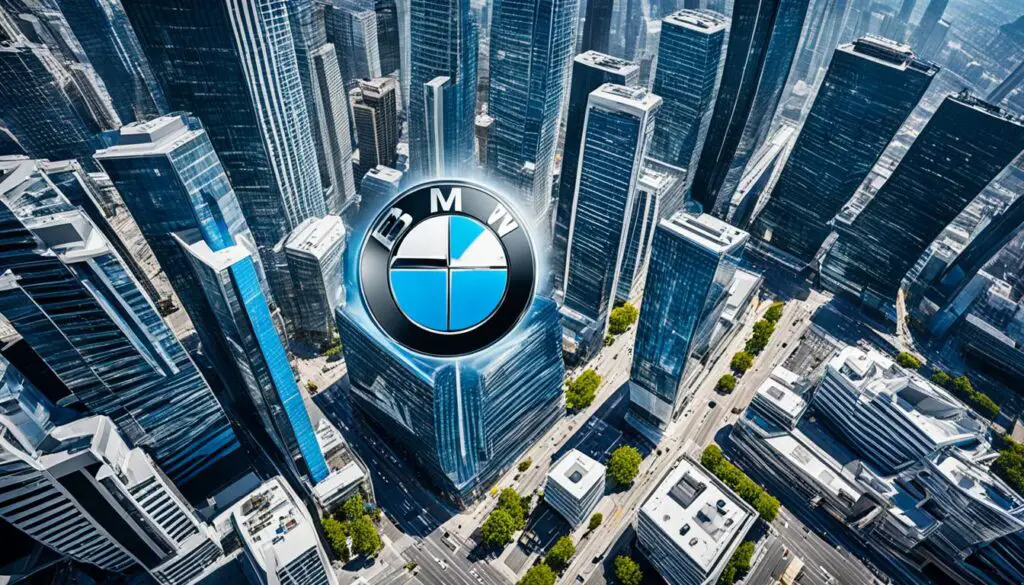
BMW’s Brand Significance
The BMW brand is highly regarded in the automotive industry, synonymous with quality, innovation, and luxury. One of the most recognizable aspects of the BMW brand is its logo, a circular blue and white emblem.
BMW Logo: An emblem of excellence.
While there is a popular belief that the BMW logo represents a rotating propeller, the company has clarified that this interpretation is a myth. The logo is, in fact, derived from the coat of arms of Bavaria, representing the Bavarian state colors.
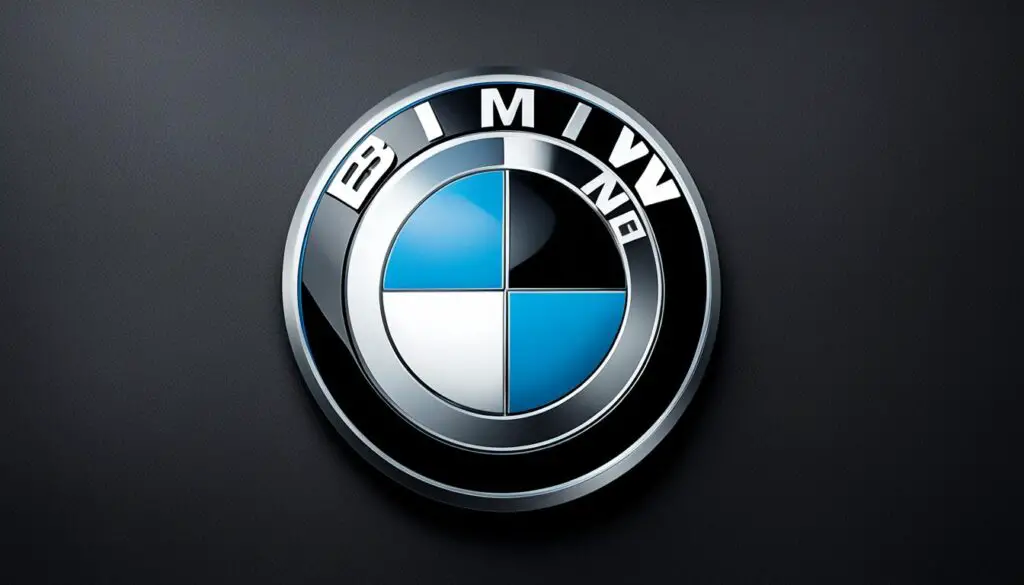
The circular design of the BMW logo symbolizes movement and dynamism, reflecting the brand’s commitment to producing vehicles that provide an exhilarating driving experience.
“The BMW logo is a visual representation of our commitment to delivering premium vehicles that stand for performance and sheer driving pleasure.” – BMW Spokesperson
With its rich heritage and impeccable reputation, the BMW brand has become a benchmark for luxury and craftsmanship. The emblematic BMW logo serves as a seal of excellence that distinguishes BMW vehicles from their competitors.
Influential BMW Models and Innovations
Over the years, BMW has introduced numerous iconic models, showcasing its dedication to innovation and pushing boundaries. Some of these influential models include:
| Model | Year Introduced | Key Features |
|---|---|---|
| BMW 2002 | 1968 | Compact sports sedan, exceptional handling |
| BMW M3 | 1986 | High-performance sports car, aggressive styling |
| BMW 3 Series | 1975 | Segment-defining compact executive car, advanced technology |
| BMW i8 | 2014 | Plug-in hybrid sports car, groundbreaking design |
These models embody the BMW brand’s commitment to engineering excellence, luxurious comfort, and cutting-edge technology. Each represents a milestone in automotive history, leaving a lasting impact on the industry.
Whether it’s the elegant design, advanced features, or exceptional performance, the BMW brand continues to captivate automotive enthusiasts and sets the standard for what a premium vehicle should be.
BMW’s Continued Success
BMW has a proven track record of success in the global automotive market. With a strong presence worldwide, the company has consistently achieved impressive sales figures and demonstrated its ability to adapt to changing consumer demands.
One key factor contributing to BMW’s success is its commitment to innovation. The company has continually introduced new models and cutting-edge technologies that resonate with customers. By staying ahead of the curve, BMW has maintained its position as a leader in the industry.
Furthermore, BMW recognizes the importance of sustainability and efficient resource management in shaping the future of the automotive sector. As part of its long-term strategy, BMW is implementing environmentally-friendly practices and developing sustainable solutions for its vehicles. This commitment not only aligns with growing consumer expectations but also positions BMW as a forward-thinking and responsible brand.
Looking ahead, BMW aims to remain at the forefront of innovation and maintain its reputation as a premium brand. By continuously pushing boundaries and delivering exceptional products and experiences to customers, BMW is poised for continued success in the ever-evolving automotive landscape.
BMW’s Sales Figures (2019-2021)
| Year | No. of Vehicles Sold |
|---|---|
| 2019 | 2,168,516 |
| 2020 | 2,028,659 |
| 2021 | 2,289,943 |
Source: BMW Group Annual Reports
Conclusion
BWM’s history and significance as an iconic brand name are firmly rooted in its origins as an aircraft engine manufacturer in the early 20th century. The company’s expansion into automobile and motorcycle production, along with its unwavering focus on innovation and quality, have established it as a global leader in the automotive industry. BMW’s steadfast commitment to sustainability and efficient resource management demonstrates its dedication to shaping a better future. With an extensive range of models and a strong presence worldwide, BMW remains a symbol of luxury, performance, and cutting-edge technology.
Over the years, BMW has continuously evolved to meet the evolving needs of its discerning customers. The brand’s relentless pursuit of excellence has led to the introduction of groundbreaking technologies and revolutionary designs. From the BMW 3 Series to the BMW X Series, each model combines elegance, power, and unmatched driving dynamics.
As BMW continues to push the boundaries of automotive innovation, it embraces a vision of sustainable mobility. With electric and hybrid models becoming increasingly prominent in its lineup, BMW is poised to lead the way towards a greener future. By incorporating advanced materials and manufacturing processes, the company is committed to reducing its environmental impact while preserving the exceptional performance that defines the BMW experience.
In summary, BMW’s rich heritage, unwavering commitment to quality, and innovative spirit have propelled it to the forefront of the automotive industry. As the brand continues to evolve and embrace new technologies, it remains a benchmark of luxury, performance, and forward-thinking design. With its iconic name and global reputation, BMW is poised to shape the future of mobility and redefine what it means to drive in the 21st century.






